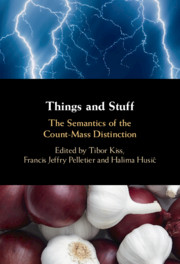Book contents
- Things and Stuff
- Things and Stuff
- Copyright page
- Dedication
- Contents
- Figures
- Tables
- Contributors and their Affiliations
- Preface
- 1 Editorial Introduction: Background to the Count–Mass Distinction
- Large-Scale Architectures for Count and Mass
- 2 Mass vs. Count: Where Do We Stand? Outline of a Theory of Semantic Variation
- 3 Counting, Plurality, and Portions
- 4 Count–Mass Asymmetries: The Importance of Being Count
- 5 Divide and Counter
- Implications from Individual Languages
- Compositional Analyses and Theoretical Issues
- New Empirical Approaches to the Semantics of the Count–Mass Distinction
- References
- Language Index
- Subject Index
4 - Count–Mass Asymmetries: The Importance of Being Count
from Large-Scale Architectures for Count and Mass
Published online by Cambridge University Press: 21 May 2021
- Things and Stuff
- Things and Stuff
- Copyright page
- Dedication
- Contents
- Figures
- Tables
- Contributors and their Affiliations
- Preface
- 1 Editorial Introduction: Background to the Count–Mass Distinction
- Large-Scale Architectures for Count and Mass
- 2 Mass vs. Count: Where Do We Stand? Outline of a Theory of Semantic Variation
- 3 Counting, Plurality, and Portions
- 4 Count–Mass Asymmetries: The Importance of Being Count
- 5 Divide and Counter
- Implications from Individual Languages
- Compositional Analyses and Theoretical Issues
- New Empirical Approaches to the Semantics of the Count–Mass Distinction
- References
- Language Index
- Subject Index
Summary
The term count/mass distinction, despite its success as a name for a domain of research, suggests a symmetry between count and mass that is not supported by cross-linguistic data. A first asymmetry is related to the grammatical encoding of count vs. mass. A second asymmetry between count and mass is related to the sensitivity of quantity expressions to count and mass meaning and count morphology. A third asymmetry concerns possible meanings of nouns. Whereas there is strong evidence that an opposition between count and mass meanings plays an important role in the lexicon even of languages that seem at first mass-only, there do seem to exist count-only languages. The second part of the paper will consider count meanings across languages. What types of meanings are count? What are reliable diagnostics for count meaning? Are there differences in this respect between obligatory number marking languages (also commonly called ‘mass/count languages’) and languages that do not have obligatory number?
Keywords
- Type
- Chapter
- Information
- Things and StuffThe Semantics of the Count-Mass Distinction, pp. 81 - 114Publisher: Cambridge University PressPrint publication year: 2021
- 1
- Cited by



